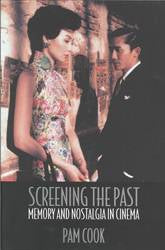Screening the Past : Memory and Nostalgia in Cinema
- Unit price
- / per
-
Author:COOK Pam
-
ISBN:9780415183758
-
Publication Date:0/10/2004
-
Edition:1
-
Pages:246
-
Binding:Paperback
-
Publisher:Routledge
-
Country of Publication:


A Back Order button means that we don’t have the book in stock at our store. It may already be on order – or we can order it for you from a publisher or distributor at no additional cost.
As we source items from around the globe, a back-order can take anywhere from 5 days to several weeks to arrive, depending on the title.
To check how long this might take, you’re welcome to contact us and we can provide an ETA or any other information you need. We recommend checking the timeframe before committing to an online order.
Screening the Past : Memory and Nostalgia in Cinema
- Unit price
- / per
-
Author:COOK Pam
-
ISBN:9780415183758
-
Publication Date:0/10/2004
-
Edition:1
-
Pages:246
-
Binding:Paperback
-
Publisher:Routledge
-
Country of Publication:
Description
Adding product to your cart
You may also like
A Back Order button means that we don’t have the book in stock at our store. It may already be on order – or we can order it for you from a publisher or distributor at no additional cost.
As we source items from around the globe, a back-order can take anywhere from 5 days to several weeks to arrive, depending on the title.
To check how long this might take, you’re welcome to contact us and we can provide an ETA or any other information you need. We recommend checking the timeframe before committing to an online order.
You may also like
You may also like
-
From Mildred Pierce and Brief Encounter to Raging Bull and In the Mood for Love, this lively and accessible collection explores film culture's obsession with the past, offering searching and provocative analyses of a wide range of titles. Screening the Past engages with current debates about the role of cinema in mediating history through memory and nostalgia, suggesting that many films use strategies of memory to produce diverse forms of knowledge which challenge established ideas of history, and the traditional role of historians. Classic essays sit side by side with new research, contextualised by introductions which bring them up to date, and provide suggestions for further reading as the work of contemporary directors such as Martin Scorsese, Kathryn Bigelow, Todd Haynes and Wong Kar-wai is used to examine the different ways they deploy creative processes of memory. Pam Cook also investigates the recent history of film studies, reviewing the developments that have culminated in the exciting, if daunting, present moment. The result is a rich and stimulating volume that will appeal to anyone with an interest in cinema, memory and identity.
-
-
Author: COOK PamISBN: 9780415183758Publication Date: 0/10/2004Edition: 1Pages: 246Binding: PaperbackPublisher: RoutledgeCountry of Publication:
From Mildred Pierce and Brief Encounter to Raging Bull and In the Mood for Love, this lively and accessible collection explores film culture's obsession with the past, offering searching and provocative analyses of a wide range of titles. Screening the Past engages with current debates about the role of cinema in mediating history through memory and nostalgia, suggesting that many films use strategies of memory to produce diverse forms of knowledge which challenge established ideas of history, and the traditional role of historians. Classic essays sit side by side with new research, contextualised by introductions which bring them up to date, and provide suggestions for further reading as the work of contemporary directors such as Martin Scorsese, Kathryn Bigelow, Todd Haynes and Wong Kar-wai is used to examine the different ways they deploy creative processes of memory. Pam Cook also investigates the recent history of film studies, reviewing the developments that have culminated in the exciting, if daunting, present moment. The result is a rich and stimulating volume that will appeal to anyone with an interest in cinema, memory and identity.-
Author: COOK PamISBN: 9780415183758Publication Date: 0/10/2004Edition: 1Pages: 246Binding: PaperbackPublisher: RoutledgeCountry of Publication:
-



